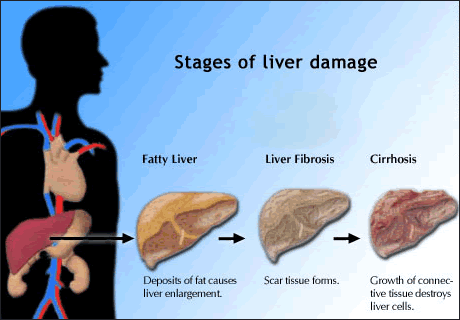Over
years or decades, chronic hepatitis
B can progress to advanced liver disease, including hepatocellular
carcinoma, cirrhosis, and liver failure. Decompensated cirrhosis
-- meaning the liver can no longer carry out its vital functions
-- is associated with high morbidity and mortality, yet treatment
options are limited.

Antiviral agents can lower HBV levels in people with advanced
cirrhosis, but they may cause side effects that patients with
severe illness are unable to tolerate. Lamivudine is generally
well-tolerated, but it is prone to resistance that can compromise
long-term effectiveness.
Most people with decompensated cirrhosis patients have some
degree of kidney impairment, indicating that adefovir
(Hepsera) and tenofovir
(Viread), which can worsen kidney dysfunction in susceptible
individuals, should be used with caution. (Another
study presented at the EASL meeting, however, showed that
tenofovir/emtricitabine appears safe in patients with mild-to-moderate
kidney impairment after liver transplantation.)
Edward Gane from Middlemore Hospital in Auckland, New Zealand,
and colleagues conducted a study comparing treatment outcomes
with telbivudine versus lamivudine in decompensated chronic
hepatitis B patients.
This double blind trial included 232 patients with decompensated
liver disease, defined as a Child-Turcotte-Pugh score above
7 and cirrhosis or portal hypertension. About three-quarters
were men, 65% were Asian, the median age was about 50 years,
and about 57% were hepatitis B "e" antigen (HBeAg)
negative.
Study participants were randomly assigned to receive 600 mg
telbivudine or 100 mg lamivudine for 104 weeks.
Results
 |
In
a 2 year intent-to-treat analysis, 49% of patients receiving
telbivudine achieved undetectable HBV DNA (< 300 copies/mL),
compared with 40% in the lamivudine arm (P = 0.15, not a
significant difference). |
 |
73%
of participants in the telbivudine arm and 62% in the lamivudine
arm experienced ALT normalization (P = 0.25, also not significant). |
 |
Looking
at a composite endpoint of undetectable HBV DNA and ALT
normalization, however, telbivudine performed significantly
better than lamivudine (34% vs 24%, respectively; P = 0.004)
|
 |
28%
of telbivudine recipients experienced viral breakthrough
while on therapy, compared with 37% of lamivudine recipients
(P = 0.16). |
 |
At
the end of treatment, about 75% of patients in both arms
had stabilized or improved liver disease, as indicated by
changes from baseline in Child-Turcotte-Pugh scores.
|
 |
Kidney
function (indicated by glomerular filtration rate) modestly
improved in the telbivudine arm, while worsening in the
lamivudine arm. |
 |
Early
(week 24) survival rates were similar in the 2 study arms,
96% with telbivudine and 92% with lamivudine. |
 |
Long-term
(week 104) survival rates were 87% and 79%, respectively,
with a trend toward statistical significance. |
 |
Serious
adverse events were common, consistent with advanced liver
disease, and occurred with similar frequency in both arms
(51% of telbivudine recipients vs 59% of lamivudine recipients). |
 |
No
cases of rhabdomyolysis (muscle damage due to drug toxicity)
or lactic acidosis (associated with mitochondrial toxicity)
were reported. |
Based
on these findings, the investigators concluded, "In a large
number of patients with long term follow-up telbivudine was
well tolerated with stabilization of liver function and comparable
tolerability to lamivudine."
Peripheral
Neuropathy
Another study sounded a note of caution, however. Patrick Marcellin
and colleagues reported that telbivudine plus pegylated interferon
led to a higher rate of undetectable HBV viral load and greater
reductions in HBeAg and hepatitis B surface antigen (HBsAg)
than either drug alone. However, patients receiving combination
therapy were more than twice as likely to experience adverse
events.
Of particular concern, peripheral neuropathy (nerve damage)
developed sooner and was more severe in the combination arm,
leading to premature discontinuation of the study. Telbivudine
is a thymidine nucleoside analog, a class of drugs associated
with peripheral neuropathy, facial fat loss, and other manifestations
associated with mitochondrial toxicity in people treated for
HIV.
The investigators recommended that "[d]espite increased
efficacy, concomitant use of [pegylated interferon + telbivudine]
should be avoided at present."
Investigator affiliations:
Gane study: Middlemore Hospital, Auckland, New Zealand; Department
of Medicine and Therapeutics, Chinese University of Hong Kong,
Hong Kong, China; Sanjay Gandhi Post Graduate Institute of Medical
Sciences, Lucknow, India; Department of Internal Medicine, Asan
Medical Center, University of Ulsan College of Medicine, Seoul,
Republic of Korea; Phramongkutklao Hospital, Bangkok, Thailand;
Holy Family Hospital, Nazareth & Hadassah Medical Center,
Jerusalem, Israel; Siriraj Hospital, Bangkok; Chiang Mai University,
Faculty of Medicine, Chiang Mai, Thailand; Sieff Government
Hospital, Safed, Israel; Department of Hepatology, Institute
of Liver and Biliary Sciences, New Delhi, India; Novartis Pharma
Corporation, East Hanover, NJ.
Marcellin study: Service d'Hépatologie, INSERM, Hôpital
Beaujon, Clichy, France; Novartis Pharma AG, Basel, Switzerland;
Hannover Medical School, Hannover, Germany; Kaohsiung Medical
University, Kaohsiung, Taiwan ROC; Clinical Trial Center, LKS
Faculty of Medicine, University of Hong Kong, Hong Kong, China;
China Medical University Hospital, Taichung, Taiwan ROC; Middlemore
Hospital, Auckland, New Zealand; Hospital de Enfermedades Infecciosas,
Buenos Aires, Argentina.
4/30/10
Reference
EJ Gane, HL Chan, G Choudhuri, and others. Treatment of decompensated
HBV-cirrhosis: results from 2-years randomized trial with telbivudine
or lamivudine. 45th Annual Meeting of the European Association
for the Study of the Liver (EASL 2010). Vienna, Austria. April
14-18, 2010. (Abstract).
P Marcellin, C Avila, K Wursthorn, and others. Telbivudine (LdT)
plus peg-interferon (pegIFN) in HBeAg-positive chronic hepatitis
B -- very potent antiviral efficacy but risk of peripheral neuropathy
(PN). 45th Annual Meeting of the European Association for the
Study of the Liver (EASL 2010). Vienna, Austria. April 14-18,
2010. (Abstract).